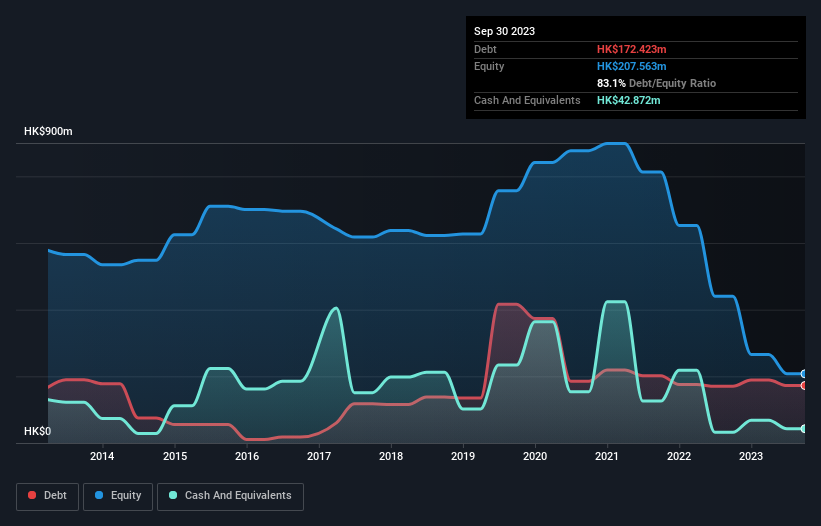- Hong Kong
- /
- Commercial Services
- /
- SEHK:1172
Magnus Concordia Group (HKG:1172) Has Debt But No Earnings; Should You Worry?

Legendary fund manager Li Lu (who Charlie Munger backed) once said, 'The biggest investment risk is not the volatility of prices, but whether you will suffer a permanent loss of capital.' So it seems the smart money knows that debt - which is usually involved in bankruptcies - is a very important factor, when you assess how risky a company is. Importantly, Magnus Concordia Group Limited (HKG:1172) does carry debt. But is this debt a concern to shareholders?
Why Does Debt Bring Risk?
Debt is a tool to help businesses grow, but if a business is incapable of paying off its lenders, then it exists at their mercy. In the worst case scenario, a company can go bankrupt if it cannot pay its creditors. However, a more frequent (but still costly) occurrence is where a company must issue shares at bargain-basement prices, permanently diluting shareholders, just to shore up its balance sheet. Having said that, the most common situation is where a company manages its debt reasonably well - and to its own advantage. When we examine debt levels, we first consider both cash and debt levels, together.
Check out our latest analysis for Magnus Concordia Group
What Is Magnus Concordia Group's Debt?
The chart below, which you can click on for greater detail, shows that Magnus Concordia Group had HK$172.4m in debt in September 2023; about the same as the year before. However, it does have HK$42.9m in cash offsetting this, leading to net debt of about HK$129.6m.

How Healthy Is Magnus Concordia Group's Balance Sheet?
We can see from the most recent balance sheet that Magnus Concordia Group had liabilities of HK$602.7m falling due within a year, and liabilities of HK$57.3m due beyond that. On the other hand, it had cash of HK$42.9m and HK$59.6m worth of receivables due within a year. So it has liabilities totalling HK$557.4m more than its cash and near-term receivables, combined.
This deficit casts a shadow over the HK$254.3m company, like a colossus towering over mere mortals. So we definitely think shareholders need to watch this one closely. After all, Magnus Concordia Group would likely require a major re-capitalisation if it had to pay its creditors today. The balance sheet is clearly the area to focus on when you are analysing debt. But you can't view debt in total isolation; since Magnus Concordia Group will need earnings to service that debt. So when considering debt, it's definitely worth looking at the earnings trend. Click here for an interactive snapshot.
In the last year Magnus Concordia Group had a loss before interest and tax, and actually shrunk its revenue by 71%, to HK$449m. To be frank that doesn't bode well.
Caveat Emptor
Not only did Magnus Concordia Group's revenue slip over the last twelve months, but it also produced negative earnings before interest and tax (EBIT). Indeed, it lost a very considerable HK$227m at the EBIT level. When we look at that alongside the significant liabilities, we're not particularly confident about the company. We'd want to see some strong near-term improvements before getting too interested in the stock. It's fair to say the loss of HK$235m didn't encourage us either; we'd like to see a profit. And until that time we think this is a risky stock. When analysing debt levels, the balance sheet is the obvious place to start. However, not all investment risk resides within the balance sheet - far from it. We've identified 2 warning signs with Magnus Concordia Group (at least 1 which doesn't sit too well with us) , and understanding them should be part of your investment process.
Of course, if you're the type of investor who prefers buying stocks without the burden of debt, then don't hesitate to discover our exclusive list of net cash growth stocks, today.
New: Manage All Your Stock Portfolios in One Place
We've created the ultimate portfolio companion for stock investors, and it's free.
• Connect an unlimited number of Portfolios and see your total in one currency
• Be alerted to new Warning Signs or Risks via email or mobile
• Track the Fair Value of your stocks
Have feedback on this article? Concerned about the content? Get in touch with us directly. Alternatively, email editorial-team (at) simplywallst.com.
This article by Simply Wall St is general in nature. We provide commentary based on historical data and analyst forecasts only using an unbiased methodology and our articles are not intended to be financial advice. It does not constitute a recommendation to buy or sell any stock, and does not take account of your objectives, or your financial situation. We aim to bring you long-term focused analysis driven by fundamental data. Note that our analysis may not factor in the latest price-sensitive company announcements or qualitative material. Simply Wall St has no position in any stocks mentioned.
About SEHK:1172
Magnus Concordia Group
An investment holding company, engages in the property, printing, and treasury businesses in Hong Kong, Mainland China, the United States, the United Kingdom, France, and internationally.
Low and slightly overvalued.
Similar Companies
Market Insights
Community Narratives



